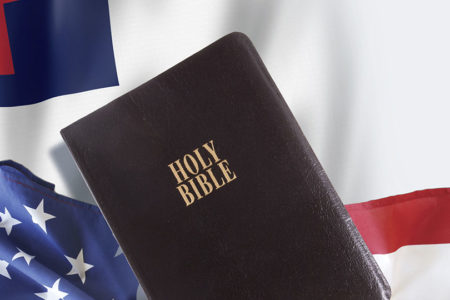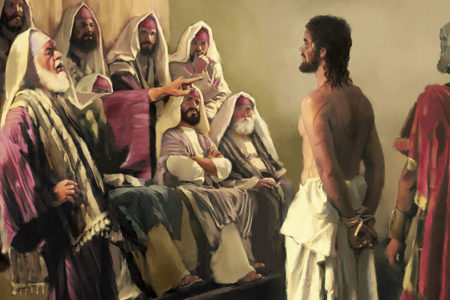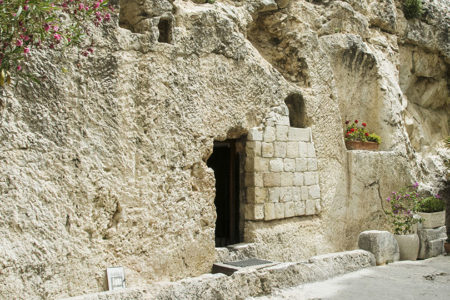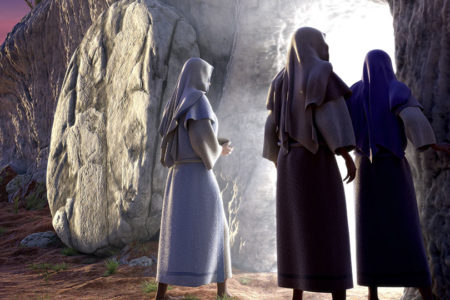The Greatest Sacrifice
With Passover beginning at sundown on April 14, grocery stores are stocking up on kosher items. Kosher literally means “fit and suitable,” and the laws of kashrut tell observant Jewish people what they can and cannot eat.
Not surprisingly, more is involved in making something kosher than most people realize. The animals must be slaughtered in a way that causes them no pain, and all their blood must be drained. To ensure no blood remains, the animal flesh is soaked in salt water. The reason for this procedure is found in Leviticus: “I will set My face against that person who eats blood, and will cut him off from among his people” (17:10).
The Law made it clear that Jewish people were never to eat blood. So, in their desire to obey God, rabbis thoroughly inspect all meat before labeling it “kosher.” God declared,
“For the life of the flesh is in the blood, and I have given it to you upon the altar to make atonement for your souls; for it is the blood that makes atonement for the soul.” Therefore I said to the children of Israel, “No one among you shall eat blood, nor shall any stranger who dwells among you eat blood” (vv. 11–12).
Why was God so unequivocal on this issue? Noted biblical scholar Dr. Charles Ryrie explained, “Two reasons are given for the command not to eat blood: the life of the body is derived from it, and it is the means by which atonement for sins is made.”1 The blood was always the source of atonement.
Sacrifices in the Levitical system were costly because God demanded that people bring the best they had. The sacrifices presented to Him had to be perfect; spotless; without blemish, injury, or issue. The animal could not have a broken bone, for example, or a problem with its teeth or fur. It could not be blind or deaf. God demanded absolute perfection.
He instructed Moses and the Israelites regarding the first Passover: “Your lamb shall be without blemish” (Ex. 12:5). Years later He said, “Cursed be the deceiver who has in his flock a male, and takes a vow, but sacrifices to the Lᴏʀᴅ what is blemished—for I am a great King” (Mal. 1:14).
Slaughtering the sacrifice before the Lord probably was not a pleasant process. The person bringing the sacrifice placed his hand on the animal, imputing his sin to the innocent beast. Then the priest killed the sacrifice. Blood flowed freely. It was collected and poured out before the brazen altar, on which much of the animal often was burned. The more sacrifices that were brought, the stronger the smell of burning flesh filled the air; and blood covered the priests. The area was virtually an outdoor slaughterhouse for the sole purpose of covering sin.
Under the Law, almost everything was cleansed by blood. Of the 301 references to blood in the Hebrew Scriptures, 68 of them (22.6 percent) appear in the book of Leviticus.
Old Testament sacrifices had to be repeated over and over because, as the Bible states, “It is not possible that the blood of bulls and goats could take away sins” (Heb. 10:4). They were temporary coverings for sin until someone came who could deal with the problem once and for all.
The One whom God promised would deal with sin is the Jewish Messiah:
So shall He sprinkle many nations. Surely He has borne our griefs and carried our sorrows; yet we esteemed Him stricken, smitten by God, and afflicted. But He was wounded for our transgressions, He was bruised for our iniquities; the chastisement for our peace was upon Him, and by His stripes we are healed. All we like sheep have gone astray; we have turned, every one, to his own way; and the Lᴏʀᴅ has laid on Him the iniquity of us all (Isa. 52:15; 53:4–6).
His sacrifice was the costliest of all: “‘I, if I am lifted up from the earth, will draw all peoples to Myself.’ This He said, signifying by what death He would die” (Jn. 12:32–33).
The Bible contains many prophecies about the Messiah’s death for sinners, both Jewish and Gentile. Several passages in the Hebrew Scriptures picture His suffering. In fact, Jesus quoted one of them as He hung on the cross: “My God, My God, why have You forsaken Me?” (Ps. 22:1).
The prophet Zechariah taught that the Messiah’s execution would involve piercing and that, despite His death, He will someday return:
And I will pour on the house of David and on the inhabitants of Jerusalem the Spirit of grace and supplication; then they will look on Me whom they pierced. Yes, they will mourn for Him as one mourns for his only son, and grieve for Him as one grieves for a firstborn. In that day a fountain [of blood] shall be opened for the house of David and for the inhabitants of Jerusalem, for sin and for uncleanness (Zech. 12:10; 13:1).
The New Testament confirms that God’s only provision for removing sin and obtaining His forgiveness is through blood sacrifice: “Without shedding of blood there is no remission” (Heb. 9:22).
In God’s amazing love, He came to this planet to deal with sin, the biggest problem humanity faces: “For He made Him who knew no sin to be sin for us, that we might become the righteousness of God in Him” (2 Cor. 5:21).
Jesus was the final and greatest sacrifice. He shed His blood so that individuals everywhere can receive forgiveness of sin if they place their faith in Him.
Corrie ten Boom was a Christian Holocaust survivor. She and her family were deported to the Nazi death camps for protecting Jewish people, and she endured the evils of the Ravensbruck concentration camp. She was the only member of her family who made it out of World War II alive. Years later, she declared,
The blood of Jesus Christ has great power! There is perhaps not a phrase in the Bible that is so full of secret truth as is “The blood of Jesus.” It is the secret of His incarnation, when Jesus took on flesh and blood; the secret of His obedience unto death, when He gave His life at the cross of Calvary; the secret of His love that went beyond all understanding when He bought us with His blood; the secret of the enemy and the secret of our eternal salvation.2
Robert Lowry said it well in his timeless hymn, “Nothing But the Blood,” written in 1876: “What can wash away my sin? Nothing but the blood of Jesus.” His blood is the only source for cleansing and forgiveness for all mankind for all eternity.
ENDNOTES
- Charles C. Ryrie, The Ryrie Study Bible, NKJV (Chicago, IL: Moody Press, 1985), 184 n Leviticus 17:11.
- Corrie ten Boom <dailychristianquote.com/dcqjesus2.html>.






